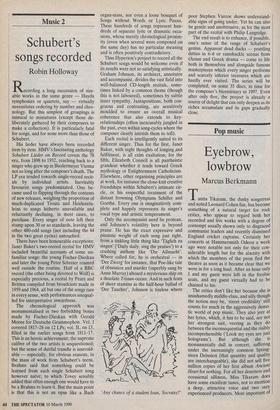Music 2
Schubert's songs recorded
Robin Holloway
Recording a long succession of size- able works in the same genre — Haydn symphonies or quartets, say — virtually necessitates ordering by number and chro- nology. But this simplest of groupings is inimical to miniatures (except those de- liberately gathered by their composers to make a collection). It is particularly fatal for songs, and for none more than those of Schubert.
His lieder have always been recorded item by item. HMV's fascinating anthology Schubert Lieder on Record covers the 78 era, from 1898 to 1952, reaching back to a singer who grew up in Biedermeyer Vienna not so long after the composer's death. The LP era tended towards single-record recit- als by individual artists. Inevitably favourite songs predominated. One be- came used to flipping through the contents of new releases, weighing the proportion of much-duplicated Trouts and HeidenrOs- leins to songs hitherto unavailable and reluctantly declining, in most cases, to purchase. Every singer of note left their stamp upon 30 or so standards, leaving the other 480-odd songs (not including the 44 in the two great cycles) untouched.
There have been honourable exceptions: Janet Baker's two-record recital for HMV included beautiful accounts of some un- familiar songs: the young Fischer-Dieskau and later the young Peter Schreier roamed well outside the routine. Half of a BBC record (the other being devoted to Wolf) is especially precious, a recital by Pears and Britten compiled from broadcasts made in 1959 and 1964, all but one of the songs rare in every sense, with performances unequal- led for interpretative inwardness.
The chronological approach was monumentalised in two forbidding boxes made by Fischer-Dieskau with Gerald Moore for Deutsche Grammophon. Vol. I covered 1817-28 on 12 LPs; vol. II, on 13, filled in the earlier songs from 1811-17. This is an heroic achievement; the supreme calibre of the two artists is unquestioned; but the sense of dutiful trundle is unavoid- able — especially, for obvious reasons, in the mass of work from Schubert's teens. Brahms said that something could be learned from each single Schubert song however naive; to which Tovey sensibly added that often enough one would have to be a Brahms to learn it. But the main point is that this is not an opus like a Bach organ-mass, nor even a loose bouquet of Songs without Words or Lyric Pieces. These hundreds of songs represent hun- dreds of separate lyric or dramatic occa- sions, whose merely chronological proxim- ity (even when several were composed on the same day) has no particular meaning and is often positively contradictory.
Thus Hyperion's project to record all the Schubert songs would be welcome even if its results were not so satisfying artistically. Graham Johnson, its architect, annotator and accompanist, divides the vast field into well-balanced CD-length recitals, some- times linked by a common theme (though this is not laboured), sometimes by subtle inner sympathy. Juxtapositions, both con- gruous and contrasting, are sensitively moulded to ensure an overall musical coherence that also extends to key- relationships (often inexcusably jangled in the past, even within song-cycles where the composer clearly intends them to tell).
Each recital is intelligently suited to its different singer. Thus for the first, Janet Baker, with night thoughts of longing And fulfilment, is all calm exaltation; for the fifth, Elizabeth Connell is all pantheistic grandeur whether it tends toward Greek mythology or Enlightenment Catholicism. Elsewhere, other organising principles are at work, for instance the close-knit creative friendships within Schubert's intimate cir- cle, or his respectful treatment of the distant frowning Olympians Schiller and Goethe. Every one is imaginatively com- plete and happily represents its singer's vocal type and artistic temperament.
Only the accompanist need be protean, and Johnson's volatility here is beyond praise. He has the exact expressive and pianistic weight of each song just right, from a tinkling little thing like 'Taglich zu singen' (Daily daily, sing the praises') to a crashing anthem like 'Die Allmacht'. Where called for, he is orchestral — in `Der Zwerg' for instance, that Poe-like tale of obsession and murder (superbly sung by Anne Murray) aboard a mysterious ship on a desolate Tristan-ocean. And in such feats of sheer stamina as the half-hour ballad of `Der Taucher', Johnson is tireless where `Any chance of a student loan, Socrates?' poor Stephen Varcoe shows understand- able signs of going under. Yet he can also be gentle and unobtrusive, as for the most part of the recital with Philip Langridge.
The end result is to enhance, if possible, one's sense of the range of Schubert's genius. Apparent dead ducks — prattling ditties in 6-8 or ramshackle scenas from Ossian and Greek drama — come to life both in themselves and alongside famous masterpieces which every singer performs and scarcely inferior treasures which are hardly ever visited. The series will be completed, on some 35 discs, in time for the composer's bicentenary in 1997. Even after only five, the project is already a source of delight that can only deepen as its riches accumulate and its gaps gradually close.


























































 Previous page
Previous page